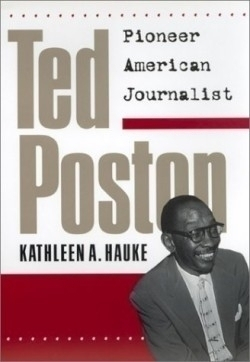Ted Poston
Pioneer American Journalist
In 1936 when Ted Postern was hired at the New York Post he became the first African American to cross the color line onto a ?white? newspaper. By the time of his retirement in 1972, he was widely known as “the dean of Black journalists.” In this first full-length biography of Poston, Kathleen Hauke presents a well-researched and engaging portrait of a reporter and the scenes he covered.
Born and raised in Hopkinsville, KY, Poston arrived in Harlem in 1928, just in time to experience the last years of the Harlem Renaissance, where he became friends with some of its central figures such as Langston Hughes. Hauke’s description of the energy and excitement of Harlem during this era is particularly well done.
Poston worked odd jobs and wrote for various Black newspapers in New York and the surrounding area before landing at the Post (the well-respected and progressive Post of the 1930s should not be confused with the tabloid that now shames its name). During WWII, he was invited to join FDR’s so-called “Black Cabinet.”
After the war Poston was increasingly asked to cover stories of the burgeoning civil rights movement in the South, such as the integration of Central High School in Little Rock and the trial of Byron de la Beckwith for the murder of Medgar Evars. Frequently, these assignments were dangerous for Poston. Often he countered racism with his much admired sense of humor, such as the time a southern white sheriff asked him whether he worked for a “white” paper or “one of them nigger papers.” Poston answered, “I understand that here in the South if you got one drop of Negro blood then you’re a Negro. Well, I’m the one drop of Negro blood on the Post, so I guess it’s a Negro paper.”
Hauke does a wonderful job of presenting both the personality of Poston (including both his charming side and his abusive side) and his historical importance. The author has also edited a collection of Poston’s stories about his hometown of Hopkinsville (The Dark Side of Hopkinsville, 1991). It would have been better if Hauke had given us more samples of Poston’s reportage to witness through his eyes how he saw some of the important events he covered. Despite this flaw, Hauke’s biography is a fine addition to the history of American journalism.
Reviewed by
Erik Bledsoe
Disclosure: This article is not an endorsement, but a review. The publisher of this book provided free copies of the book to have their book reviewed by a professional reviewer. No fee was paid by the publisher for this review. Foreword Reviews only recommends books that we love. Foreword Magazine, Inc. is disclosing this in accordance with the Federal Trade Commission’s 16 CFR, Part 255.

